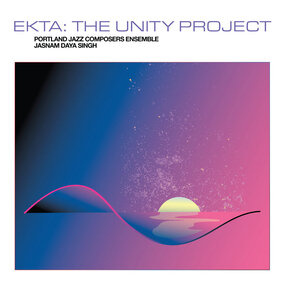
Taking the Punjabi word for “unity” as the works’ title, Ekta: The Unity Project is a meditation on the oneness of all people and the music is a meeting of the Brazilian choro and samba of Brasil—Jasnam’s birth country—European Jazz and Classical styles, sweet swing, and lush ballads that can only come from the mind and through the pen of Jasnam Daya Singh.
The PJCE orchestra is: Lee Elderton, soprano sax; John Savage, alto saxophone; Tim Willcox, tenor saxophone; Mieke Bruggeman, bari saxophone/bass clarinet; Noah Simpson and Douglas Detrick, trumpet/flugelhorn; Stan Bock and John Moak, trombone; Ryan Meagher, guitar; Jasnam Daya Singh, piano; Dave Captein, bass; Ken Ollis, drums.
These are just the people to bring Jasnam’s phenomenal work to life.
I first came to know and appreciate Jasnam through his work and collaboration with the brilliant composer and guitarist Hristo Vitchev. Jasnam released solo piano albums on his own and he has, in any project, never failed to impress. Ask me to name my top tier piano favorites and you will hear Jasnam Daya Singh on that list.
Of EKTA: The Unity Project, Douglas Detrick, Executive Director of the PJCE remarked, “The release of this recording in 2020 and the message it implies come during a time of intense upheaval in American life, a time when a true feeling of solidarity is rarer than at any other time in recent memory. Singh’s work posits that unity is an ideal to consider deeply, to celebrate joyfully, and to work strenuously to achieve.”
That message comes from the very essence and heart of Jasnam. He is a man of compassion and understanding and this work reveals that remarkably.
The work begins with Prologue. The solo flugelhorn opens the piece with Jasnam, Dave Captein’s bass and Ken Ollis’ drums. Then the entire ensemble joins in with this warm and lush overture. Immediately, Jasnam’s wonderful piano virtuosity becomes evident in measures that would make Bill Evans smile. Ryan Meagher’s guitar is effortless and enticing. The artists capture the richness of Jasnam’s compositions and do not fail in their delivery of that message.
Edinenie follows. Edinenie is translated as “coming together” or “unification.” The cool corps progressions are a slick musical coming together that give way to cool solos and great horn passages. This was a bouncy number that effuses joy in cooperation.
Acceptance has sweet passages of trumpets and saxes. Savage gets a very nice solo that segues into Meagher’s guitar before passing off to the trombone. But wait for Jasnam’s singular piano solos. These were worth the price of admission alone. A second round of solos shows the plurality of voices in cooperation, all sprung from acceptance.
Believing is Seeing is a beautiful ballad that features baritone clarinet and trombone. The phrase is obviously a juxtaposition of the original cliché. The solo piano is a clear declaration of what it means to believe in someone—even ourselves—and in our community of humanity and seeing us as no longer us and them but only us.
Unueco is the Esperanto word for “unity.” That unity is certainly evidenced n the tightness of the arrangement and performance of the piece. The great rhythms and harmonies are delivered in anthemic proclamation. The solos contribute to the message of the whole and in way detract or divide. In fact, at times, the instruments sound like the chorus of many voices partaking in the unity.
Oneness is a meditation, a self-reflection of community. The instrumental cries are of one voice. If EKTA: The Unity Project is about unity of the human community, then Oneness is the centerpiece of that theme. The beauty of individual voices contributing to the whole is the very essence of unity from diversity, reminding us that unity never means uniformity. Voices rich, then somber, now flighty, here romantic, there wistful, all become part of the magnetic pull of the music and the theme of solidarity.
The album concludes with Walking Together. Jasnam’s vision of the human future is not labored or difficult. It is a joyful dance of possibilities and achievement. With all the artists having their say, all the voices expressing themselves, we find that the unity of the whole contributes to the joy of the individual who, in turn, contributes again to the whole.
EKTA: The Unity Project is not about Utopia—it is not the absence of division but the overcoming of it. Nor is it simply a hope for the future but a vision that begins with coming together, followed by acceptance, and ending in oneness and walking forward together.
Jasnam Daya Singh is not only a national treasure. He is a global one.
~Travis Rogers, Jr. is The Jazz Owl
 RSS Feed
RSS Feed
